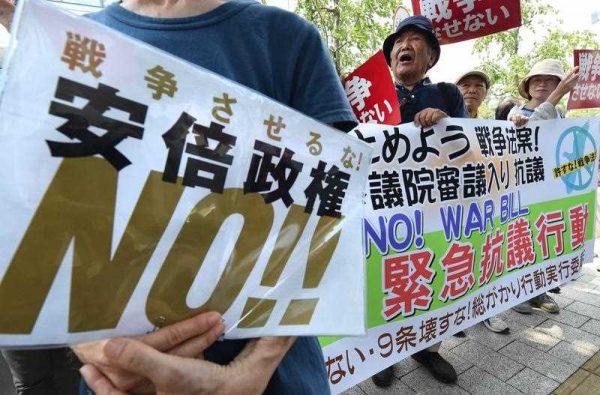Abe has extended the parliamentary sitting by three months to secure the outcome before he faces re-election to the presidency of the Liberal Democratic Party (LDP) and therefore the prime ministership. He rammed the bills through the lower house in the knowledge that, even should the House of Councillors reject them, ultimate passage of the bills would be secured after a 60 day reconsideration and re-passage with a two-thirds majority through the House of Representatives. So, with enactment of the unpopular proposals almost guaranteed even if all of the opposition parties band together to block them in the upper house, why is the Abe government in trouble over the issue?
Article 9 (the ‘peace clause’) of Japan’s post-war constitution, foreswears the use of military force as a means of settling international disputes. The Japan Self-Defense Forces (SDF) are restricted from using force unless directly attacked and are limited to the minimum level necessary to defend Japan. This (and the security agreement with the United States) has been the cornerstone of Japan’s ‘defenceless-on-all-sides’ security stance for the past seven decades.
In July 2014 the Abe cabinet moved to reinterpret the constitution in a way that would recognise limited forms of collective self-defence. The security bills, once passed by both houses, will allow this reinterpretation to be implemented. The SDF will acquire the right to use force to come to the aid of a ‘foreign country in a close relationship with Japan’ if ‘three new conditions’ are satisfied: the attack threatens the Japanese people’s constitutional right to ‘life, liberty and pursuit of happiness’; there are no other means to repel the attack; and the use of force is limited ‘to the minimum extent necessary’.
The bills will also expand the scope for the SDF to provide logistical support to friendly countries, and respond to ‘grey zone’ infringements of Japanese territorial waters and airspace short of an armed attack. They also loosen the constraints on SDF participation in UN peacekeeping operations.
‘The government has the responsibility to assume every possible situation and to prepare seamless measures. For that reason, the security legislation is necessary’, Abe said during the upper house plenary session. He argued that the legislation would lift Japan’s deterrent power, reduce the risk of its becoming a target of armed attack and that relaxing restrictions on the SDF’s operation was necessary to protect the lives of Japanese citizens given the changing security environment in the region. He undertook to work harder to gain public understanding on the issue.
Public trust over enactment of the security legislation has, in fact, been collapsing. Resorting to the 60-day rule to get the legislation through would likely undermine it further. The polling suggests that the majority of the public is against passing the security bills this Diet session because the government has not explained adequately why the changes — such as allowing Japan to use force overseas for the first time in post-war history — are necessary.
Abe’s attempts to persuade people otherwise appear to have had little effect so far. His cabinet’s approval rating has dropped below 40 per cent and those who disapprove now exceed those who approve of his prime ministership. Although the main opposition Democratic Party of Japan (DPJ) continues to trail well behind the government in the polls, there are emerging strains between the LDP’s coalition partner, Komeito, and its Sokka Gakkai support base over the security issue, and a chance that Abe might face a challenge for the leadership of the LDP, unthinkable just a few months ago.
In this week’s lead essay, Ben Ascione explains that ‘the legality of the bills has come under scrutiny after three prominent constitutional scholars testified before the Diet that the bills were unconstitutional’. The government initially maintained that these scholars were not representative of the consensus among experts but was forced to backtrack after it became obvious this was untrue. An independent media survey of 151 leading constitutional law scholars revealed that only three held the security bills to be constitutional.
‘There is also some public distrust of Abe’s ultimate intentions’, says Ascione. ‘Abe is on the public record as wanting to formally revise Article 9. Doing so requires not only a two-thirds majority in both houses, but also a majority in a national referendum. Without the public support for a formal revision, reinterpreting the constitution was a practical, if unpopular, way for Abe to move forward with his security agenda. Critics have labelled his approach a “revision by stealth” and a “destruction of the rule of law”’.
The two big questions that arise because of the way in which the question has been managed are what effect the troubles with the security bills will have on Abe’s prime ministership and how they will play into the regional security environment.
Abe has already expended a great deal of political capital on the issue. This distracts massively from resolute pusuit of his critcal economic reform agenda. The threat to his leadership is from within the LDP, not from the opposition parties, which continue in disarray.
‘On the regional security front’, writes Ascione, ‘the positive security gains of implementing collective self-defence — notably the increased deterrence and interoperability of the US–Japan alliance — will be mitigated if Japan fails to conduct sufficient diplomatic reassurance. China and South Korea are concerned that the legislative changes will negatively impinge on their security, especially amid tensions over history and territorial issues’.
Against this background, Abe’s speech to commemorate the 70th anniversary of World War II in August will be crucial to providing the reassurance that will be necessary to regional trust.
Peter Drysdale is Editor of the East Asia Forum.

